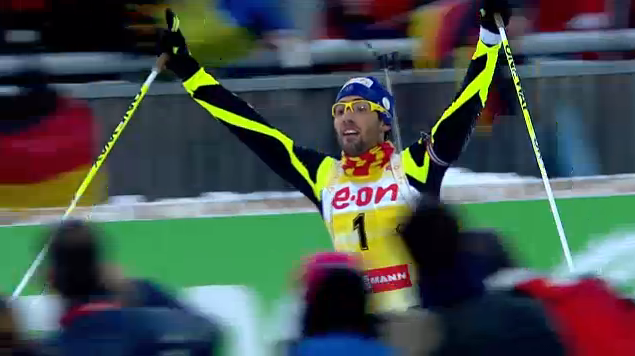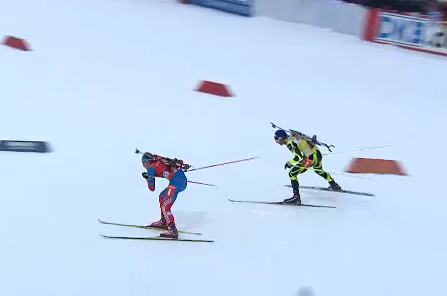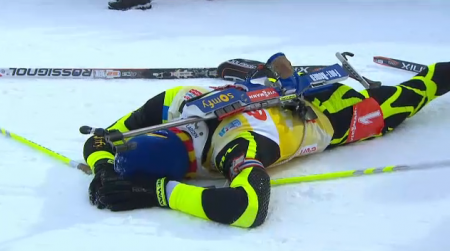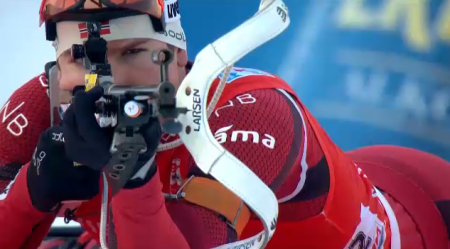
While Martin Fourcade of France won two World Cup competitions in the first trimester of racing, it’s only natural that he re-found his footing after Christmas in Ruhpolding, Germany.
After all, 2012 World Championships were arguably where Fourcade has made his biggest mark in biathlon. In Ruhpolding, he swept through the sprint and pursuit, then added a third title in the mass start.
It was a thoroughly dominating performance at the time, and this weekend as the World Cup returned to Ruhpolding, the Fourcade of 2013 looked exactly like the Fourcade of World Championships. Perhaps the biggest difference was that this time around, France also won the relay; Fourcade reported that it was the first time he had won three races in a single weekend. French newspaper Le Monde crowned him “Roi de Ruhpolding”, or the King of Ruhpolding.
In the 15 k mass start today, Fourcade shot clean in round after round, as the number of chasers who had achieved the same mark dwindled. After the first prone stage, 17 men were clean; after the third stage the number was down to four, but only one was able to hang with the Frenchman.
And, taking a page from Petter Northug’s book, Fourcade had taunted the field over two loops. He would raise the pace, jump-skating up a hill, before slowing down and looking over his shoulder while he allowed the field to bunch up again. Rinse and repeat. On the second loop, after sprinting up a hill, he pulled off to the side and motioned for someone else to lead. The group complied, but by the time they hit the range again, Fourcade was back on point one.

But the man who left that stage with him, Lars Helge Birkeland, was determined not to be trifled with. Having collected his first World Cup top-ten in the sprint the day before the Norwegian was feeling confident and stuck to Fourcade like a shadow. Fourcade was clearly working hard, too; he would press forward up the hills and sometimes gain a tiny gap on Birkeland, but the Norwegian would be back on his tails again on the flats. There was no slowing up now.
Finally, with less than a kilometer to go on the lap, Birkeland was sprung, hard. Initially a two-second gap, he faded and as the men entered the range, he had been swallowed by a chasing group about five seconds behind.
Fourcade and Birkeland both cleaned – despite the effort, the Norwegian was still strong – but so did Dmitry Malyshko of Russia, who had climbed his way back from a penalty in the very first stage. As the three left the range it looked like it would be a battle for the podium, but Birkeland quickly disappeared by the mix, caught by Bjorn Ferry of Sweden.
“Today’s race I liked even more than the wins in Oberhof,” Malyshko told the Russian press. “This time I encountered such a struggle. We were stuck together – the race was entertaining.”
Fourcade and Malyshko dueled their was around the 3 k loop, first one leading, then the other, and each looking like they couldn’t possibly go any faster. Malyshko had been the hero of last week for the Russians, anchoring the winning relay and then winning both the sprint and pursuit, crossing the three-win weekend off his list the very first time he ever stood atop the podium. Take that, Martin.

(“Last week, when Malyshko won three races in Oberhof, I told myself that it was still out there for me to do,” Fourcade said in the press conference. “I had never done it… this is the first thing I said upon arrival, that I want to have done it at least once in my life.”)
Malyshko was clearly a worthy competitor, and Fourcade couldn’t drop him – or even consistently stay in front – no matter how hard he tried. But remarkably, the pair was actually losing ground to the rest of the field. A group led by Emil Hegle Svendsen on Norway and Jakov Fak of Slovenia, who had each accumulated two penalties as they went, and Alexis Boeuf of France and Germany’s Simon Schempp, each of whom had one penalty, soon passed Birkeland and Ferry.
It seemed impossible that they could catch the leaders, but all four men could practically taste the podium, and as they raised their speed higher and higher in order to best one another they began appearing in the background of shots focusing on the leaders. While they never made it to the front, the deficit had closed to just ten seconds by the finish; Svendsen won the sprint, with Boeuf getting the best of a photo finish with Schempp for fourth.
But at the front, Malyshko feared Fourcade’s finishing speed.
“I know what the weak point in my race is,” he said through a translator at the press conference. “I hoped to beat him on the hills.”
Malyshko was in front coming into the last downhill, a sweeping lefthand turn into the stadium that had taken out Germany’s Andreas Birnbacher on the first lap. And that was his mistake: Fourcade slingshotted past. The two were close coming down the finishing stretch, but the Frenchman was able to stay a bootlength ahead of Malyshko.

In the press conference, Fourcade was asked when he knew he would win. Was it perhaps the fourth stage, when he had shot clean?
“One meter before the finish was when I knew I would win!” he replied. “I used all of my strength to beat him today.”
After lying in the snow for several minutes, Fourcade told NRK, the Norwegian television company, that he was exhausted and that it was one of the hardest races he had ever done.
But with the luxury of clean shooting, he arguably didn’t work as hard as Svendsen or Fak, who ended up sixth. The pair were so close to the win, despite two more penalty loops adding up to almost half an extra kilometer. Svendsen told NRK that he just had too many misses to win.
“It was a fun competition, but still a hard day at the office,” he said in the press conference. “I am happy with my sprint. It was a big battle with Fak and Boeuf, who are good sprinters… The only way to beat [Fourcade] is by getting better myself; I must focus on myself not the others.”
Birnbacher ended up seventh for Germany, followed by Henrik L’Abee-Lund of Norway and then Ferry and Birkeland.

Tim Burke was in the mix for much of the race, sitting in fourth place with the lead group as he came into the third stage. But he missed a shot in each of the two last stages and finished 19th overall. It was a strong performance considering that he sat out the relay and sprint because he was sick.
“I had no idea what to expect today going into the race,” Burke wrote in an e-mail. “After not training so much the past week and fighting sickness, I was a little nervous about how I would feel. Considering everything, I am pretty happy with the race. I actually felt much better than expected for about 4 loops. I was tiring a bit on the last loop but this to be expected considering the week I had.
“Now I am really looking forward to Antholz [Italy], which is my favorite course on the World Cup,” he concluded. “Judging from today’s race I feel like I can be back to good form by next weekend’s races.”
In his first mass start appearance, Scott Perras placed 26th for Canada.
Chelsea Little
Chelsea Little is FasterSkier's Editor-At-Large. A former racer at Ford Sayre, Dartmouth College and the Craftsbury Green Racing Project, she is a PhD candidate in aquatic ecology in the @Altermatt_lab at Eawag, the Swiss Federal Institute of Aquatic Science and Technology in Zurich, Switzerland. You can follow her on twitter @ChelskiLittle.



